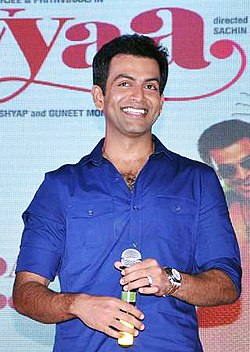

An Army officer is determined to liberate the Kashmir Valley from terrorism. Facing immense challenges, he risks everything, including his life and relationships, to fight for peace and justice. His dedication and bravery spark hope, but the cost of his mission may be more than he ever imagined.
July 25
2025
Release Date
Hindi
Language
17 minutes
2 hours
Running Time
Available on
Cast


Prithviraj Sukumaran


Kajol


Ibrahim Ali Khan


Mihir Ahuja


Boman Irani


Jitendra Joshi




Abdul Quadir Amin




Rohed Khan




Athar Siddiqui
2.5
Average Rating
The above-mentioned average rating is based on the derived ratings of multiple review platforms
OH Review


Review of Sarzameen
Plot
"Sarzameen" is a film that attempts to explore the emotional turmoil faced by a soldier, Major Vijay Menon, portrayed by Prithviraj Sukumaran, set against the troubled backdrop of Kashmir. The film revolves around the central conflict of duty versus family, especially when Menon, a strict army officer, learns that his son Harman, played by Ibrahim Ali Khan, has been kidnapped by terrorists. The intricate weavings of duty, loyalty, and familial bonds are strong themes, reminiscent of the classic 1982 film "Shakti," where a father's moral conundrum is at the forefront. However, the predictability of the plot undermines its emotional intensity. Within the first 20 minutes, audiences can easily foresee the trajectory of the story, as it unfolds in a rather formulaic manner. The major conflict hinges on Menon’s willingness to let go of personal ties for the greater good of his nation, and the film attempts to show the emotional ramifications of that choice. Unfortunately, several unrealistic plot points, such as the lack of basic security measures at a major event, make it difficult for viewers to suspend disbelief. The writing misses out on creating plausible scenarios, leading to a fragmented narrative that feels unfinished and rushed. The dual storylines of a family drama interspersed with a spy thriller could have been engaging, but they become lost in the execution. The connections between characters and their motivations are inadequately developed, and they often feel shallow or incomplete. As the narrative progresses, viewers are treated to moments of chaos and emotional struggle, yet the transitions from one scene to another lack the smoothness necessary for a cohesive story. The film’s attempt to touch on profound themes of love, inherited trauma, and the possibility of redemption is commendable, but the execution falls flat, leaving viewers asking more questions than receiving satisfying answers. The film’s pacing also proves a challenge, with an uneven rhythm that fails to maintain tension throughout. There are glimmers of what could have been—a relationship torn apart by external tensions and personal failures—but they are marred by plot holes and an underdeveloped script. Ultimately, while "Sarzameen" tries to say something meaningful, the summation offers less closure than one might hope for, feeling instead like a missed opportunity.
Acting
The performances in "Sarzameen" are a mixed bag, with some actors shining while others struggle to make an impact. Prithviraj Sukumaran, who takes center stage as Major Vijay Menon, displays a commendable commitment to his role. He imbues the character with gravitas, bringing to life the struggles of a soldier caught between his duty to serve and the love for his family. However, even his talent is rendered ineffective due to the film's weak writing, leaving him with an emotional depth that feels stunted. Kajol, an actress known for her powerful performances, plays the emotionally burdened mother, Meher. Her portrayal stands out, bringing a sincerity that adds layers to her character. However, the chemistry between Kajol and Prithviraj feels forced, and their interactions often miss the mark, which is disappointing given their star power. In moments where emotional resonance is crucial, the duo fails to captivate the audience fully, detracting from the film's overall effectiveness. An area that sparks debate is Ibrahim Ali Khan's performance as Harman. While he shows potential and has moments where he successfully conveys vulnerability, especially during action sequences, there are instances where he appears awkward and unconvincing in delivering the emotional weight demanded by the script. His struggle with dialogue delivery is apparent, threatening to detract from the urgency of the narrative. The absence of romantic subplots this time around arguably works in his favor, allowing him to focus on the complexities of his character. Supporting performances, such as Mihir Ahuja's role, add vibrancy and necessary commentary to the narrative despite their limited screen time. However, the inconsistencies in character development affect the overall cohesiveness - causing the audience to sense a lack of depth that could have brought genuine connection to these characters. The overriding issue remains that while certain performances shine, they are obscured by the screenplay's inherent flaws, hindering any emotional investment the audience could muster. In essence, the film showcases a talent pool that hints at potential yet falls short due to a lack of dedication to well-rounded, engaging character arcs, compounded by a script that doesn't provide the actors with the material they need to succeed. Ultimately, this leads to an experience that may leave viewers yearning for emotional connections that were just out of reach.
Cinematography
Lush landscapes and vivid scenery predominantly shape the cinematography of "Sarzameen," capturing the breathtaking beauty of Kashmir with poignant visuals that could have carried the weight of the narrative if given the right context. The film does well to showcase panoramic views of rugged mountains, serene valleys, and the struggles inherent in a tumultuous region, providing a stunning backdrop that elevates the aesthetic appeal. Cinematographer Manush Nandan has managed to bring out evocative imagery that resonates with the themes of conflict and emotional struggle presented throughout the film. The use of natural light in outdoor scenes and tightly wound shots during moments of tension contribute a gripping element that hints at the chaos lurking beneath the surface of the picturesque landscape. The framing often feels deliberate, with views set against the backdrop of scenic beauty underscoring the harsh realities faced by the film's characters. Action sequences are well-executed, showcasing Krishnamachari's deftness in choreographing thrilling experiences that are gritty and effective without falling into the trap of excess. The tension built during these climactic moments showcases a promising direction; however, the effectiveness is ultimately diluted by the uneven pacing that contradicts the film’s more intense moments. Yet, despite the film's visual triumphs, inconsistencies inhibit its credibility. The disjointed editing and abrupt transitions between emotional scenes eliminate the build-up needed for the audience to connect with key moments, making them feel small amid the broad strokes of cinematic grandeur. There's a fine line to tread when trying to achieve both captivating visuals and narrative depth—ideally, they should complement each other, yet in "Sarzameen," such harmony is frequently absent. To summarize, while the cinematography of "Sarzameen" has moments that brilliantly capture the beauty and tension of its setting, it struggles to maintain coherence within the film's storytelling framework. The visuals stand as a testament to what could have been—a beautifully woven tale that resonates on an emotional level—but fall prey to the narrative weaknesses that drown out their potential impact.
Direction
Direction is critical to the overall expression of a film, and Kayoze Irani's debut feature "Sarzameen" demonstrates both potential and inexperience in a way that leaves viewers feeling perplexed. His approach to storytelling attempts to balance multiple themes and conflicts, but unfortunately, the execution does not live up to the ambition. Throughout the film, Irani struggles to maintain a consistent tone, as the pacing fluctuates between drawn-out sequences and rushed plot developments. Initially, the film runs slowly, allowing characters to establish their identities, yet as the story picks up speed, pivotal moments feel crammed and lack the emotional gravitas they deserve. The major twist, intended to create shock value, lands flat due to the surrounding narrative failing to earn its weight. The absence of clear character development and motivation does a disservice to the tension Irani aims to create. Moreover, while Irani achieves some dramatic heights, he falters in creating well-rounded characters that viewers can connect with on an emotional level. Sudden character changes and motivations appear without expert justification, leaving audiences scratching their heads. Emotional arcs that should bring powerful resolutions feel rushed and incomplete, diluting the story's impact significantly. Irani's ambition to deliver a narrative that contemplates heavy themes such as loyalty, sacrifice, and redemption is evident. However, the writing ultimately appears cobbled together, lacking coherence and clarity. The filmmakers seem eager to touch on varied topics, but in trying to say too much at once, it results in a muddled delivery that struggles to resonate deeply. All in all, Kayoze Irani's direction hints at untapped potential that could evolve with future projects. There are moments of pure cinematic brilliance peppered throughout "Sarzameen," but the inconsistencies in pacing and character development lead to an experience that, while ambitious, feels relegated to mediocrity. It would serve both the script and the audience well for Irani to lean into one narrative thread more thoroughly, allowing the weight of emotional stakes to breathe rather than skip across uneven terrain.
Conclusion
"Sarzameen" offers a glimpse into the intricate dance of duty and familial loyalty wrapped in a powerful premise, exploring the challenging dynamics of love and sacrifice amid the harsh realities of conflict. However, despite its potential, the execution falters on multiple levels, resulting in a film that struggles to deliver an engaging and coherent experience. The writing, characterized by lazy choices and unrealistic scenarios, detracts from the emotional gravity of the subjects at hand. The performances hold merit; Kajol shines as the emotional anchor while Prithviraj and Ibrahim Ali Khan display moments of promise, though are ultimately constrained by an insufficient script. The cinematography captures the stunning landscapes of Kashmir but fails to align with the narrative, leaving a disconnect between visual grandeur and story depth. Ultimately, while "Sarzameen" bravely attempts to break away from conventional war narratives and delve deeper into personal battles, it remains an average film, falling short of its ambitious aims. It presents a unique premise that could have made a strong emotional impact, yet weak character arcs and plot inconsistencies render it a fleeting engagement rather than a memorable cinematic experience. Watch it if you’re curious about its thematic explorations, or simply want to see Kajol in a role that offers her the opportunity for deeper emotional expression—but don’t go in expecting a tightly woven narrative or satisfying resolutions to its profound questions. "Sarzameen" remains a film that illustrates its potential yet ultimately hinges on the shortcomings of its execution, resulting in a watchable—but hardly memorable—viewing experience.
Share this review
The Great Reviews
Times of India
Rediff
Times Now
More like this
Mardaani 3
In Mardaani 3, in a gripping race against time, brave officer Shivani Shivaji Roy returns to save girls who have mysteriously vanished. With danger lurking a...
Azad Bharath
In Azad Bharath, neera Arya becomes a courageous freedom fighter in India's first women's army, founded by Subhas Chandra Bose. As she battles for independen...


